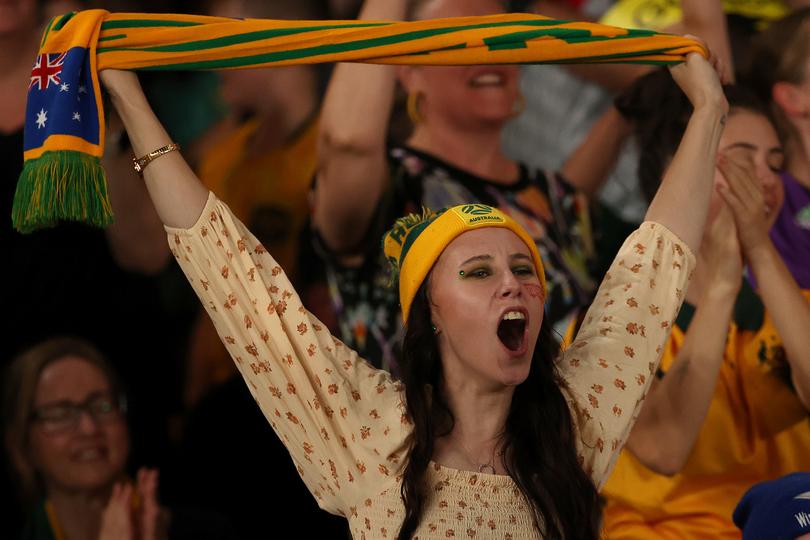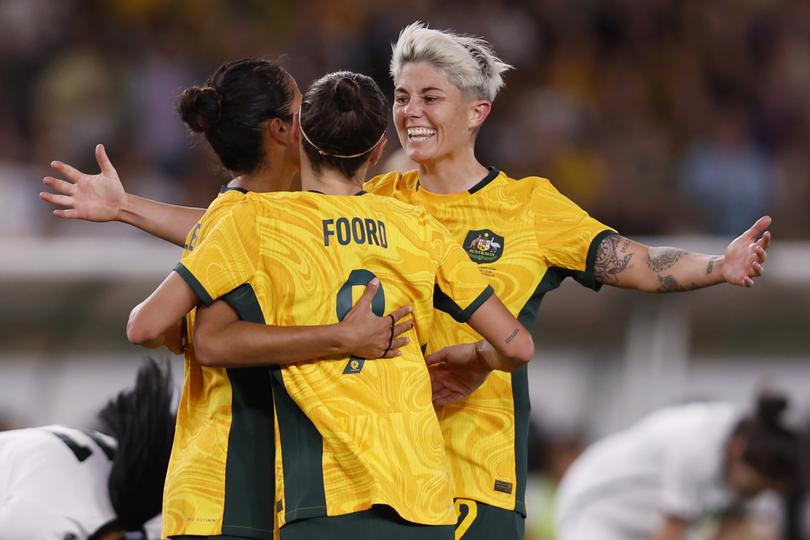Georgie Parker: Matildas text that made me realise women’s sport had changed forever
The Matildas have debunked the myth that women in sport can’t make money. You just have to give them a proper run at it.
“God I love watching the Matildas!” A message sent to me at 9.38pm Wednesday by my 36-year-old male mate, Matt.
“YTG!! Aren’t they wicked!” was my reply. At this stage the Matildas were 8-0 up and booked their place at the Paris Olympics in July. It was another sell out match for the beloved Aussie team, with 54,120 fans in attendance at Marvel Stadium.
While the Socceroos had a nice turnout of 20,876 at their last match in Melbourne in November, Wednesday was the Matildas’ 12th consecutive sell out home match in what has been an extraordinary shift of not only how we see the sport of football in Australia, but female sport in general.
Sign up to The Nightly's newsletters.
Get the first look at the digital newspaper, curated daily stories and breaking headlines delivered to your inbox.
By continuing you agree to our Terms and Privacy Policy.Would I have received texts from male mates 10 years ago about female sport? Maybe? But most likely not, because there’s a huge chance no one would have known it was even on because the coverage would have been so dismal. But things are changing, and isn’t it so wonderful seeing it happening before our very own eyes?
A study released on Wednesday by the Office of Women in Sport called “The Conversation” has highlighted some unsurprising (to say the least) data.
It has shown that in 2022/23, sports news focused on women remained at a minority of only 15 per cent, female journalists only made up 27 per cent of bylines, and men were 12 times more likely to be quoted speaking about women’s sport than women were quoted regarding men’s sports.

The only shining light for me, is this report was finished in May 2023, prior to the Women’s World Cup, and the rise of the Matildas. These now household name women have been the game-changers our country needed, and have shifted men to accepting and appreciating women playing sport.
The cut-through this team have had with men is absolutely insane. During the World Cup, for the first time in my life, I witnessed groups of men gathering to watch female sport together. Not as a family or as a parent and not because their partner was making them, but because they wanted to. It became “cool” to be a fan of the Matildas. It just became football, not “chicks’ football”. The Matildas are the football team we think of, not the Socceroos, and isn’t that something.
Men were talking about it at their desks at work, they had WhatsApp group chats about Mary Fowler not believing she was the youngest player in the Australian World Cup squad, and they are now (as are we all) deeply concerned about Sam Kerr’s ACL and hate that women are up to eight times more likely to suffer that damned ligament than men are.
This flow-on effect is maybe not front of mind or appreciated by men as it is to women like myself, but for those of us who grew up with very few women to idolise and for children who now know no other it is enormous.

All of this matters. It shapes how we view women in sport and puts pressure on media outlets and broadcasters to let women take up more space in what is quite clearly somewhere we haven’t been allowed for some time, as both athletes and journalists.
The Matildas have shown that investment can equal return. The sell out stadiums (the bigger the better). The eyeballs on the screens. The selling of the jerseys. The sponsors coming in hot. The notion and myth that women can’t make money has been debunked. You just have to give them a proper run at it.
The problem I see is that the trickle down hasn’t changed domestic sport in Australia. Yet. Although the numbers have absolutely increased this year, the love for the Matildas has been slow to translate to greater affection for the A-League Women.
In the AFLW, while players are being paid more due to their recent joint collective bargaining win, the league is still trying to find its place in the sporting calendar with the men’s season being as long as it is. Meanwhile, the Australian women’s cricket team are the best in the world but are still fighting to play more Tests.
How do we change this when there is already so much sport to consume? It begins with long-sighted investment, which will lead to more media coverage, which as we have seen, can produce extraordinary outcomes.
And, hopefully next comes some more ACL research so Sam Kerr can get back to doing backflips on the field as soon as humanly possible.
Georgie Parker is a former Hockeyroo and AFLW player.
